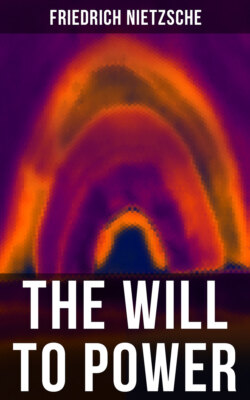Читать книгу Nietzsche: The Will to Power - FRIEDRICH NIETZSCHE, Friedrich Nietzsche - Страница 4
На сайте Литреса книга снята с продажи.
ОглавлениеTable of Contents
VOLUME I
PREFACE
BOOK I. EUROPEAN NIHILISM
A Plan
I. Nihilism
1. Nihilism As an Outcome of the Valuations and Interpretations of Existence Which Have Prevailed Heretofore
2. Further Causes of Nihilism.
3. The Nihilistic Movement As an Expression of Decadence.
4. The Crisis: Nihilism and the Idea of Recurrence.
II. Concerning the History of European Nihilism
(a) Modern Gloominess.
(b) The Last Centuries.
(c) Signs of Increasing Strength.
BOOK II. CRITICISM OF THE HIGHEST VALUES THAT HAVE PREVAILED HITHERTO
I. Criticism of Religion
1. Concerning the Origin of Religions.
2. Concerning the History of Christianity.
3. Christian Ideals.
II. A Criticism of Morality
1. The Origin of Moral Valuations.
2. The Herd.
3. General Observations Concerning Morality.
4. How Virtue Is Made to Dominate.
5. The Moral Ideal.
A. A Criticism of Ideals.
B. A Criticism of the "Good Man" of the Saint, etc.
C. Concerning the Slander of the so-called Evil Qualities.
D. A Criticism of the Words: Improving, Perfecting, Elevating.
6. Concluding Remarks Concerning the Criticism of Morality.
III. Criticism of Philosophy
1. General Remarks.
2. A Criticism of Greek Philosophy.
3. The Truths and Errors of Philosophers.
4. Concluding Remarks in the Criticism of Philosophy.
VOLUME II
BOOK III. THE PRINCIPLES OF A NEW VALUATION
I. The Will to Power in Science
(a) The Method of Investigation.
(b) The Starting-point of Epistemology.
(c) The Belief in the "Ego." Subject.
(d) Biology of the Instinct of Knowledge. Perspectivity.
(e) The Origin of Reason and Logic.
(f) Consciousness.
(g) Judgment. True—false.
(h) Against Causality.
(i) The Thing-in-Itself and Appearance.
(k) The Metaphysical Need.
(l) The Biological Value of Knowledge.
(m) Science.
II. The Will to Power in Nature
1. The Mechanical Interpretation of the World.
2. The Will to Power as Life.
(a) The Organic Process.
(b) Man.
3. Theory of the Will to Power and of Valuations.
III. The Will to Power as Exemplified in Society and the Individual
1. Society and the State.
2. The Individual.
IV. The Will to Power in Art
BOOK IV. DISCIPLINE AND BREEDING
I. The Order of Rank
1. The Doctrine of the Order of Rank.
2. The Strong and the Weak.
3. The Noble Man.
4. The Lords of the Earth.
5. The Great Man.
6. The Highest Man as Lawgiver of the Future.
II. Dionysus
III. Eternal Recurrence
